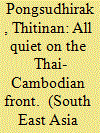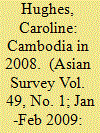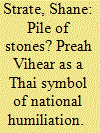| Srl | Item |
| 1 |
ID:
163112


|
|
|
|
|
| Summary/Abstract |
That Thai-Cambodian relations are stable and peaceful after Thailand’s most recent military coup in 2014 is counterintuitive and inconsistent with recent trends and dynamics. When governments loyal to Thaksin Shinawatra took power over the past decade, bilateral relations were cordial and constructive. Conversely, when anti-Thaksin governments were in office, Thai-Cambodian relations became unstable and adversarial. But this has not been the case after the military regime under General Prayut Chan-ocha seized power and overthrew the Thaksin-aligned government of Prime Minister Yingluck Shinawatra. The dominant strand of scholarly explanations attributes the volatile bilateral relationship to Thai historical forces interacting with domestic politics, underpinned by a ‘national humiliation’ discourse dating to French imperialism. But such an informed understanding is unable to pinpoint the timing and extent of the bilateral conflict when it flared up. Synthesising overlapping streams of literature and drawing on select interviews, this article sets out to demonstrate that the post-coup Thai government’s commitment and resolve to prevail at all costs ahead of the royal succession and the incumbent Cambodian government’s weakened political legitimacy at home have combined to situate and normalise bilateral relations on a new plateau.
|
|
|
|
|
|
|
|
|
|
|
|
|
|
|
|
| 2 |
ID:
086700


|
|
|
|
|
| Publication |
2009.
|
| Summary/Abstract |
The Cambodian People's Party (CPP) consolidated legislative control with a decisive election victory in 2008. Four contributing factors are identified: CPP control of local authorities who can deliver the vote, its marginalization of the opposition, the mass patronage enabled by an economic boom, and exploitation of a border dispute with Thailand.
|
|
|
|
|
|
|
|
|
|
|
|
|
|
|
|
| 3 |
ID:
120005


|
|
|
|
|
| Publication |
2013.
|
| Summary/Abstract |
The most recent border tensions between Thailand and Cambodia represent only the latest round of conflict over the status of Preah Vihear (Thai: Phra Viharn). This article uses newspaper and archival material to explore the modern history of the temple, largely from the Thai perspective, and focuses on how Preah Vihear has become the centrepiece of a Thai discourse on National Humiliation. Beginning with Prime Minister Phibun Songkhram's irredentist campaign of 1940, the Thai have associated these ancient ruins with the legacy of Western imperialism, particularly the territory 'lost' to French Indochina. For Thai nationalists, the 1962 international court case that awarded sovereignty over the temple site to Cambodia is an example of neo-imperialism that is part of this legacy. Thai media coverage of the court case compared the Preah Vihear situation with past defeats, including the loss of the four provinces in 1946 and the Franco-Siamese crisis of 1893. Conversely, Sihanouk and Cambodian leaders constructed a counter-narrative that compared Thai claims to Preah Vihear with the long history of Siamese imperialism in the region. It is Preah Vihear's centrality in National Humiliation discourse, rather than its religious or architectural significance, which makes it a powerful icon.
|
|
|
|
|
|
|
|
|
|
|
|
|
|
|
|